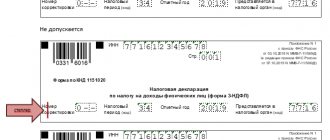Interest on loans must be reflected in the VAT return. These transactions bring the company that issued the loan non-sale income, which should be recorded in tax reporting. In relation to income tax, these amounts should be included in non-operating income receipts.
When filing a VAT return, you must use the report template from the Federal Tax Service order dated October 29, 2014 No. ММВ-7-3/ [email protected] (as amended on December 20, 2016). The document is submitted to the Federal Tax Service only in electronic form via TKS channels (only tax agents who are not VAT payers or are exempt from payment have the right to report on paper).
Accrual of interest on deposits and issued loans - non-operating income
Every entrepreneur, when organizing his own business, strives for a single goal - to make a profit. But for this you need to generate some income. Income can be received from the sale of products of own production, goods previously purchased for the purpose of resale, as well as from the performance of work and the provision of services. This concerns the main activity of an economic entity.
But there is another type of income. Thus, an individual entrepreneur or organization can open a deposit account with a banking institution in order to receive additional funds in the form of accrued interest on the balance of this account. Additional income can also be obtained by issuing funds to other economic entities and charging the borrower interest for use. Accrued interest receivable on both deposits and loans issued will constitute so-called non-operating income, which must subsequently be taken into account when calculating income tax.
In the income tax return, the amounts of accrued interest receivable will be included in line 100 of Appendix 1 to Sheet 02.
What about the VAT return? Are the specified non-operating incomes included in it?
Starting from the report for the 4th quarter of 2021, it is necessary to use a new VAT declaration form, approved. by order of the Federal Tax Service dated August 19, 2020 No. ED-7-3/ [email protected]
Sections 8 and 9
Section 8 reflects information from the purchase book. That is, data on received invoices. But only those for which the right to deduction arose in the reporting quarter.
This section is completed by taxpayers and tax agents. An exception is tax agents who sell seized property by court decision, as well as goods, work, services, property rights of foreign organizations that are not tax registered in Russia (clauses 4 and 5 of Article 161 of the Tax Code of the Russian Federation). They do not fill out section 8.
Section 9 reflects information from the sales book. That is, data on issued invoices. But only for those transactions that increase the tax base of the reporting quarter.
This section is to be completed by taxpayers and tax agents. In the TIN and KPP fields, indicate the TIN and KPP of the organization, respectively. In the "Page" field – page serial number.
The order of filling out the lines of sections 8 and 9 is given in the table.
Appendix No. 1 to sections 8 and 9
Appendix No. 1 to section 8 of the declaration is filled out if changes are made to the purchase books of expired quarters (for which declarations have already been submitted). Like Section 8, Appendix 1 to Section 8 is completed by all taxpayers entitled to a tax deduction. As well as tax agents, except those named in paragraphs 4 and 5 of Article 161 of the Tax Code of the Russian Federation.
Appendix No. 1 to section 9 of the declaration is filled out if changes are made to the sales books of expired quarters (for which declarations have already been submitted). Like Section 9, Appendix No. 1 to Section 9 is filled out by all taxpayers and tax agents who have the obligation to charge VAT for payment.
In the TIN and KPP fields, indicate the TIN and KPP of the taxpayer (tax agent), respectively. In the "Page" field – page serial number.
This follows from sections XIII–XI of the Procedure, approved by order of the Federal Tax Service of Russia dated October 29, 2014 No. ММВ-7-3/558.
The procedure for filling out Appendix No. 1 to sections 8 and 9 is given in the table.
Deposit interest and VAT reporting: how they are related
By placing funds in a deposit account of a banking institution, the business entity remains their owner. The money must be returned by the bank upon expiration of the agreement. In accordance with Art. 39 of the Tax Code of the Russian Federation, such an operation is not recognized as a sale. This means that interest accrued on the deposit is not subject to VAT, like amounts not related to sales. This is precisely the opinion expressed by officials of the Ministry of Finance in letter dated 10/04/2013 No. 03-07-15/41198.
Thus, interest on deposit agreements does not need to be included in the VAT report.
Increasing capital: accounting for ruble deposits and interest on them
1. What terms of the bank deposit agreement are most important for an accountant.
2. How to reflect the deposit and interest on it in accounting and tax accounting.
3. How to take into account the consequences of early termination of a bank deposit agreement.
Having a financial airbag, that is, a certain reserve of funds, is the “golden” rule of both personal and corporate finance. However, simply keeping the nth amount of money in reserve in your account is extremely unprofitable. As you know, money should work and bring... money.
That is why competent managers try to place free funds in financial investments. One of the most common types of financial investments is a bank deposit, or deposit. And there are at least two reasons for this.
Firstly, opening a deposit does not require special knowledge and skills in the field of investing. And secondly, a deposit is traditionally considered one of the least risky ways to invest money (all other things being equal).
What an accountant should know about the accounting for bank deposits and interest on them, and what “pitfalls” this seemingly simple operation may hide, we’ll look into this article.
What should an accountant pay attention to in a bank deposit agreement?
The main document that serves as the basis for recording a bank deposit and interest on it in accounting is the bank deposit agreement.
Checking the correctness of the contract, as well as the legal nuances and consequences of the transaction, is rather the task of a lawyer.
An accountant, as a rule, is only interested in some of the terms of the contract, on which the accounting reflection of the deposit depends. So, what should an accountant pay close attention to:
- Deposit term. A bank deposit can be opened for a certain period or on demand (Clause 1, Article 837 of the Civil Code of the Russian Federation). The period for which the deposit is opened depends on the order in which it is reflected in the financial statements: as part of long-term or short-term financial investments.
- Type of deposit: replenishable or non-replenishable. Depending on this, management may approve a schedule for transferring funds to replenish the deposit. Or, on the contrary, it will be known that the deposit amount will remain unchanged.
- Conditions for early termination of the contract by the investor. If the deposit is open for a certain period, then the agreement, as a rule, specifies special conditions for the return of the deposit before the expiration of the specified period in the form of a reduced interest rate. If the amount of interest for early repayment is not expressly stated in the agreement, it is taken to be equal to the interest rate on demand deposits (clause 3 of Article 837 of the Civil Code of the Russian Federation).
- Terms and procedure for interest payments. Interest on the deposit is accrued from the day following the day the bank receives funds for placement in the deposit until the day they are returned to the depositor (clause 1 of Article 839 of the Civil Code of the Russian Federation). In this case, the interest accrued on the deposit can be paid to the depositor periodically (monthly, quarterly, etc.) or in a lump sum upon expiration of the deposit term. If the procedure for paying interest is not established in the agreement, they are paid to the depositor at the end of each quarter upon his request, and unclaimed interest is added to the deposit amount on which interest is accrued (clause 2 of Article 839 of the Civil Code of the Russian Federation).
- Procedure for calculating interest. The agreement also specifies the procedure for calculating interest: using the simple or compound interest formula. Simple interest is calculated on the deposit amount, but does not increase it. Such interest is generally paid periodically. Compound interest is added to the deposit amount on which interest is calculated (capitalized) and is paid simultaneously with the return of the deposit.
Tax accounting of bank deposit and interest on it
Tax accounting of the deposit amount
Depositing funds (opening or replenishing a deposit) is not recognized as an expense for tax purposes either under the OSNO or under the simplified tax system (clause 12 of article 270, clause 1 of article 346.16 of the Tax Code of the Russian Federation). Likewise, funds returned by the bank when closing a deposit are not the taxpayer’s income (clause 1, clause 1.1, article 346.15, clause 10, clause 1, article 251 of the Tax Code of the Russian Federation).
Tax accounting of interest on deposit
- General taxation system
Interest on a deposit for the purposes of calculating income tax is recognized as non-operating income (clause 6 of Article 250 of the Tax Code of the Russian Federation). It is necessary to take into account interest in tax accounting as part of income on the last day of each month (paragraph 1, clause 6, art.
271, para. 3 p. 4 art. 328 of the Tax Code of the Russian Federation) and on the date of expiration of the deposit term (or early termination of the agreement) (paragraph 3, clause 6, article 271 of the Tax Code of the Russian Federation). The amount of interest to be reflected in accounting is calculated in accordance with the terms of the agreement.
! Please note: deposit interest amounts are subject to monthly reflection as part of taxable income, regardless of the procedure for calculating and paying interest under the agreement. That is, even if, according to the agreement, interest is capitalized and paid in a lump sum at the end of the deposit term, they must be reflected monthly in tax accounting.
Source: https://buh-aktiv.ru/uchet-rublevyh-depozitov-i-protsentov-po-nim/
Reflection of interest on loans issued in the VAT return
The situation is somewhat different with the interest that the lender accrues to the borrower when issuing loans in the form of cash.
According to sub. 15 clause 3 art. 149 of the Tax Code of the Russian Federation, the accrual of these interests is an operation exempt from VAT. It is for such operations that the tax report provides for Section 7, which contains four columns filled in as follows:
- column 1 - code 1010292 is given, designated “Loan operations in cash and securities, including interest on them...”;
- column 2 - the amount of accrued interest receivable is recorded;
- Columns 3 and 4 are crossed out.
According to paragraph 3 of Art. 169 of the Tax Code of the Russian Federation, the lender does not need to issue invoices for the amount of interest accrued under loan agreements.
When simultaneously carrying out transactions that are subject to VAT and exempt from this tax, the taxpayer must maintain separate accounting, the principles of which must be outlined in the accounting policy.







